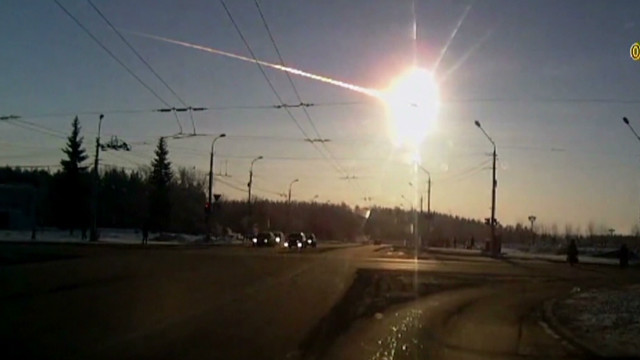Some U.S. nuclear-warhead components, scheduled for disassembly in the next year, have gotten at least a temporary new lease on life. The reason: possible use in defending the Earth against killer asteroids.
 |
| A meteor streaks through the sky over Chelyabinsk, about 1500 kilometers east of Moscow on Feb. 15, 2013 |
That bit of information was tucked deep inside a 67-page Government Accountability Office report on the National Nuclear Security Administration, which manages the U.S. atomic-weapons arsenal. The warhead components, containing highly enriched uranium, are being retained "pending a senior-level government evaluation of their use in planetary defense against earthbound asteroids," the April report said.
An NNSA spokesman declined to comment.
 |
| The wall of a zinc plant was damaged by a shockwave from a meteor in Chelyabinsk, Russia, last year. Agence France-Presse/Getty Images |
Government officials and space scientists say we aren't anywhere near a real-life replay of "Armageddon," the 1998 science-fiction extravaganza in which actor Bruce Willis and friends used a nuclear weapon to smash apart a giant asteroid hurtling toward Earth. While hundreds of asteroids with a diameter of about a kilometer or bigger—the size that could "produce global devastation," according to a 2010 National Research Council report—pass relatively near the Earth's orbit, none are expected to be a worry for at least 100 years and probably much longer, they say.
However, while no such mega-space rocks are on the horizon, an estimated 100,000 or more asteroids at least 50 meters in size also pass through Earth's neighborhood, said Lindley Johnson, a program executive at the National Aeronautics and Space Administration who oversees the effort to find such "near-earth objects." Probably no more than 5% of those objects have been catalogued so far, he said.
If a 100-meter-wide asteroid hit Washington, D.C., for instance, it "could wipe out everything inside the Beltway," Mr. Johnson said.Read the rest of the story HERE.
If you like what you see, please "Like" us on Facebook either here or here. Please follow us on Twitter here.



No comments:
Post a Comment